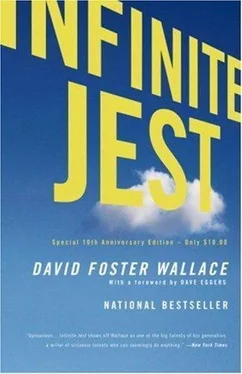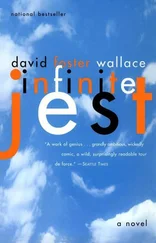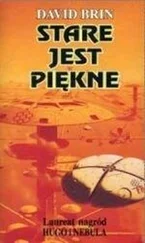‘So this has happened in the past, prior to your other hospitalizations, then, Katherine.’
Her face, foreshortened by its downward angle, was working in the spread, writhing configurations of weeping, but no tears emerged. ‘I just want you to shock me. Just get me out of this. I’ll do anything you want.’
‘Have you explored this possible connection between your cannabis use and your depressions with your regular therapist, Katherine?’
She did not respond directly as such. Her associations began to loosen, in the doctor’s opinion, as her face continued to work dryly.
‘I had shock before and it got me out of this. Straps. Nurses with their sneakers in little green bags. Anti-saliva injections. Rubber thing for your tongue. General. Just some headaches. I didn’t mind it at all. I know everybody thinks it’s horrible. That old cartridge, Nichols and the big Indian. Distortion. They give you a general here, right? They put you under. It’s not that bad. I’ll go willingly.’
The doctor was summarizing her choice of treatment-option, as was her right, on her chart. He had extremely good penmanship for a doctor. He put her get me out of this in quotation marks. He was adding his own post-assessment question, Then what? when Kate Gompert began weeping for real.
And just before Ol45h. on 2 April Y.D.A.U., his wife arrived back home and uncovered her hair and came in and saw the Near Eastern medical attache and his face and tray and eyes and the soiled condition of his special recliner, and rushed to his side crying his name aloud, touching his head, trying to get a response, failing to get any response to her, he still staring straight ahead; and eventually and naturally she — noting that the expression on his rictus of a face nevertheless appeared very positive, ecstatic, even, you could say — she eventually and naturally turning her head and following his line of sight to the cartridge-viewer.
Gerhardt Schtitt, Head Coach and Athletic Director at the Enfield Tennis Academy, Enfield MA, was wooed fiercely by E.T.A. Headmaster Dr. James Incandenza, just about begged to come on board the moment the Academy’s hilltop was shaved flat and the place was up and running. Incandenza had decided he was going to bring Schtitt on board or bust — this even though Schtitt had then just lately been asked to resign from the staff of a Nick Bollettieri camp in Sarasota because of a really unfortunate incident involving a riding crop.
By now, though, pretty much everybody now at E.T.A. feels as though stories about Schtitt’s whole corporal-punitive thing must have been pumped up out of all sane proportion, because even though Schtitt still does favor those high and shiny black boots, and yes the epaulets, still, and now a weatherman’s telescoping pointer that’s a clear stand-in for the now-forbidden old riding crop, he has, Schtitt, at near what must be seventy, mellowed to the sort of elder-statesman point where he’s become mostly a dispenser of abstractions rather than discipline, a philosopher instead of a king. His felt presence is here mostly verbal; the weatherman’s pointer has not made corrective contact with even one athletic bottom in Schtitt’s whole nine years at E.T.A.
Still, although he now has all these Lebensgefährtins [31] and prorectors to administer most of the necessary little character-building cruelties, Schtitt does like his occasional bit of fun, still.
So but when Schtitt dons the leather helmet and goggles and revs up the old F.R.G.-era BMW cycle and trails the sweating E.T.A. squads up the Comm. Ave. hills into East Newton on their P.M. conditioning runs, making judicious use of his pea-shooter to discourage straggling sluggards, it’s usually eighteen-year-old Mario Incandenza who gets to ride along in the sidecar, carefully braced and strapped, the wind blowing his thin hair straight back off his oversized head, beaming and waving his claw at people he knows. It’s possibly odd that the leptosomatic Mario I., so damaged he can’t even grip a stick, much less flail at a moving ball with one, is the one kid at E.T.A. whose company Schtitt seeks out, is in fact pretty much the one person with whom Schtitt speaks candidly, lets his pedagogical hair down. He’s not close to his prorectors, particularly, Schtitt, and treats Aubrey deLint and Mary Esther Thode with a formality that’s almost parodic. But often of a warm evening sometimes Mario and Coach Schtitt will find themselves out alone under the East Courts’ canvas pavilion or the towering copper beech west of Comm.-Ad., or at one of the initial-scarred redwood picnic tables off the path out behind the Headmaster’s House where Mario’s mother and uncle live, Schtitt savoring a post-prandial pipe, Mario enjoying the smells of the calliopsis alongside the grounds’ quincunx paths, the sweetish pines and the briers’ yeasty musk coming up from the hillside’s slopes. And he actually likes the sulphury odor of Schtitt’s obscure Austrian blend. Schtitt talks, Mario listens, generally. Mario is basically a born listener. One of the positives to being visibly damaged is that people can sometimes forget you’re there, even when they’re interfacing with you. You almost get to eavesdrop. It’s almost like they’re like: If nobody’s really in there, there’s nothing to be shy about. That’s why bullshit often tends to drop away around damaged listeners, deep beliefs revealed, diary-type private reveries indulged out loud; and, listening, the beaming and brady-kinetic boy gets to forge an interpersonal connection he knows only he can truly feel, here.
Schtitt has the sort of creepy wiriness of old men who still exercise vigorously. He has surprised blue eyes and a vivid white crewcut of the sort that looks virile and good on men who have lost a lot of hair anyway. And skin so clean-sheet-white it almost glows; an evident immunity to the sun’s UV; in pine-shaded twilight he is almost glowingly white, as if cut from the stuff of moons. He has a way of focusing his whole self’s concentration very narrowly, adjusting his legs’ spread for the varicoceles and curling one arm over the other and sort of drawing himself in around the pipe he attends to. Mario can sit motionless for really long periods. When Schtitt exhales pipe-smoke in different geometric shapes they both seem to study intently, when Schtitt exhales he makes little sounds variant in plosivity between P and B.
‘Am realizing whole myth of efficiency and no waste that is making this continent of countries we are in.’ He exhales. ‘You know myths?’
‘Is that like a story?’
‘Ach. A made-up story. For some children. An efficiency of Euclid only: flat. For flat children. Straight ahead! Plow ahead! Go! This is myth.’
‘There aren’t any flat children, really.’
‘This myth of the competition and bestness we fight for you players here: this myth: they assume here always the efficient way is to plow in straight, go! The story that the shortest way between two places is the straight line, yes?’
‘Yes?’
Schtitt can use the stem of the pipe to point, for emphasis: ‘But what then when something is in the way when you go between places, no? Plow ahead: go: collide: kabong.’
‘Willikers!’
‘Where is their straight shortest then, yes? Where is the efficiently quickly straight of Euclid then, yes? And how many two places are there without there is something in the way between them, if you go?’
It can be entertaining to watch the evening pines’ mosquitoes light and feed deeply on luminous Schtitt, who is oblivious. The smoke doesn’t keep them away.
‘When I am boyish, training to compete for best, our training facilities on a sign, very largely painted, stated WE ARE WHAT WE WALK BETWEEN.’
Читать дальше












